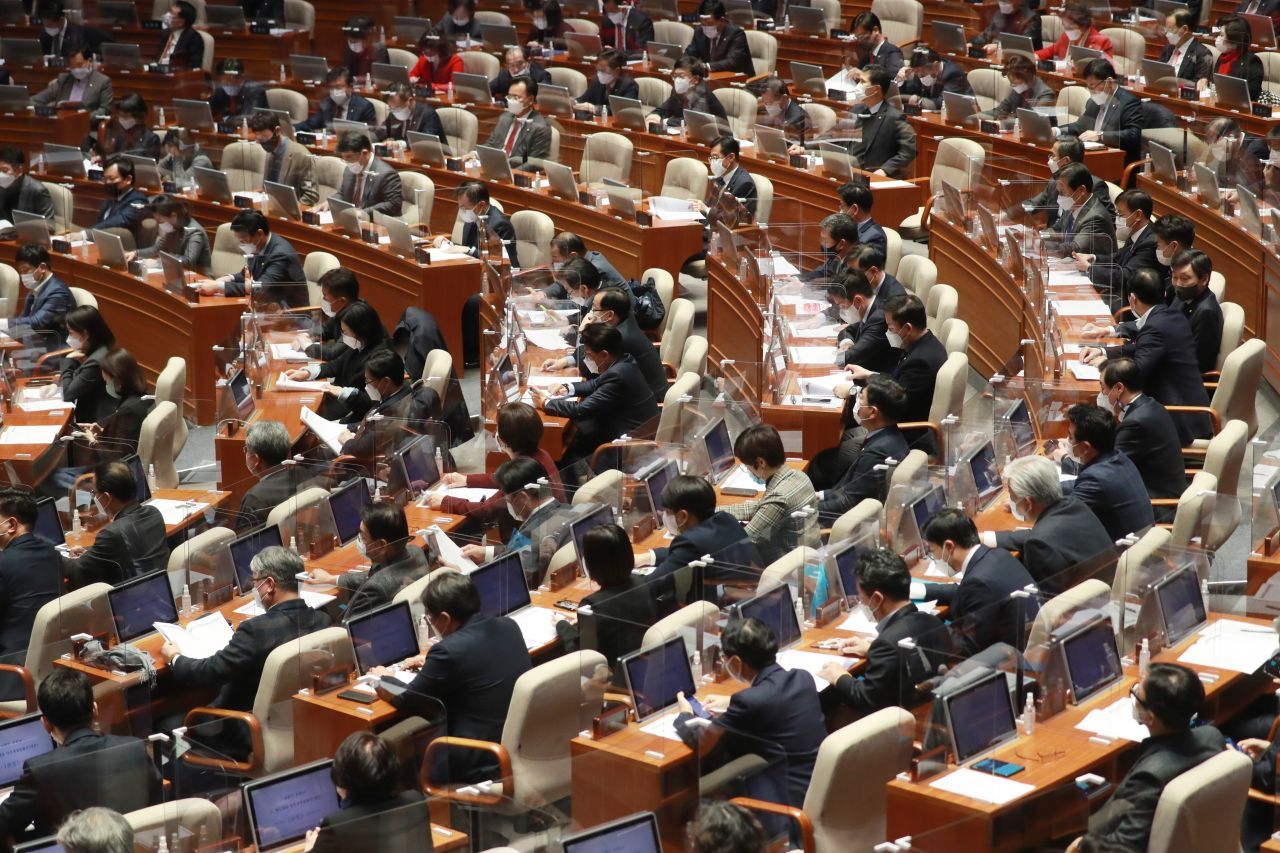Ruling party seeks to pass controversial bills at plenary session
By YonhapPublished : Dec. 9, 2020 - 13:58

The ruling Democratic Party (DP) was poised to push for the passage of a set of controversial bills through the National Assembly's plenary session Wednesday despite fierce protests from the conservative main opposition bloc.
The main opposition People Power Party (PPP) requested a filibuster to block the passage of five bills during the plenary session scheduled for 2 p.m., a parliamentary source told Yonhap News Agency. The DP currently holds a majority in the 300-member assembly.
One of the five bills the PPP is campaigning to block is designed to facilitate the launch of a new investigative body tasked with handling high-profile corruption cases.
The installation of the Corruption Investigation Office for High-ranking Officials is a key component of President Moon Jae-in's pledge to reform powerful institutions, such as the state prosecution service.
PPP lawmakers have objected to the creation of the new agency over concerns its powers would be unconstitutional.
Two other major bills aim to give police more investigative authority and deprive the National Intelligence Service of its authority to conduct anti-communist investigations.
Among other contentious bills are three bills on corporate regulations, including a revision to the Fair Trade Act, which would broaden the scope of companies subject to a stricter regulation on inter-affiliate business deals.
The revision bill was passed by the Legislation and Judiciary Committee, a major gatekeeping panel, shortly before the start of the plenary session.
The committee also passed a set of labor laws amid the opposition party's continued boycott of its meetings.
Also on the plenary session's agenda is legislation prohibiting the launching of anti-Pyongyang leaflets across the inter-Korean border, and a bill punishing those who make false claims about the Gwangju uprising on May 18, 1980.
In case of a failure to pass those bills during the parliament's regular session ending the same day, the ruling party has indicated it will use an extraordinary session starting Thursday to complete their passage.(Yonhap)
The main opposition People Power Party (PPP) requested a filibuster to block the passage of five bills during the plenary session scheduled for 2 p.m., a parliamentary source told Yonhap News Agency. The DP currently holds a majority in the 300-member assembly.
One of the five bills the PPP is campaigning to block is designed to facilitate the launch of a new investigative body tasked with handling high-profile corruption cases.
The installation of the Corruption Investigation Office for High-ranking Officials is a key component of President Moon Jae-in's pledge to reform powerful institutions, such as the state prosecution service.
PPP lawmakers have objected to the creation of the new agency over concerns its powers would be unconstitutional.
Two other major bills aim to give police more investigative authority and deprive the National Intelligence Service of its authority to conduct anti-communist investigations.
Among other contentious bills are three bills on corporate regulations, including a revision to the Fair Trade Act, which would broaden the scope of companies subject to a stricter regulation on inter-affiliate business deals.
The revision bill was passed by the Legislation and Judiciary Committee, a major gatekeeping panel, shortly before the start of the plenary session.
The committee also passed a set of labor laws amid the opposition party's continued boycott of its meetings.
Also on the plenary session's agenda is legislation prohibiting the launching of anti-Pyongyang leaflets across the inter-Korean border, and a bill punishing those who make false claims about the Gwangju uprising on May 18, 1980.
In case of a failure to pass those bills during the parliament's regular session ending the same day, the ruling party has indicated it will use an extraordinary session starting Thursday to complete their passage.(Yonhap)


















![[KH Explains] Hyundai's full hybrid edge to pay off amid slow transition to pure EVs](http://res.heraldm.com/phpwas/restmb_idxmake.php?idx=652&simg=/content/image/2024/04/18/20240418050645_0.jpg&u=20240418181020)

![[Today’s K-pop] Zico drops snippet of collaboration with Jennie](http://res.heraldm.com/phpwas/restmb_idxmake.php?idx=642&simg=/content/image/2024/04/18/20240418050702_0.jpg&u=)